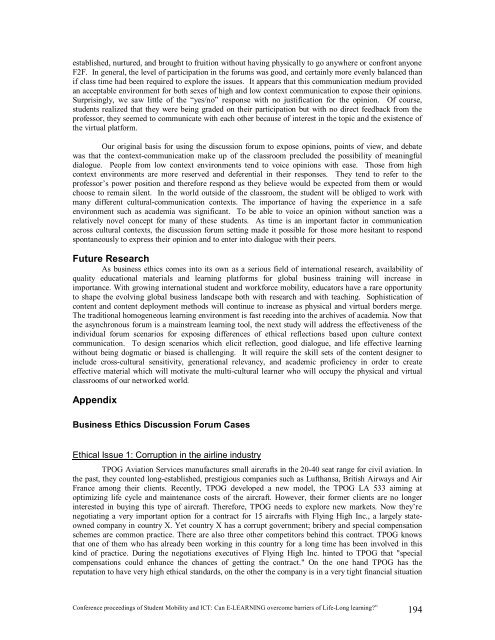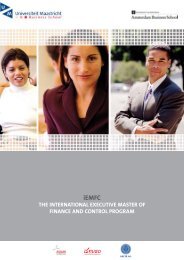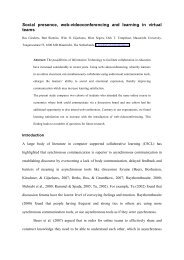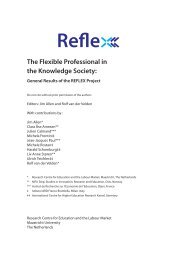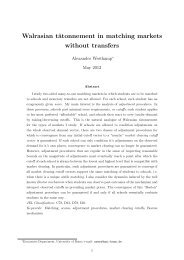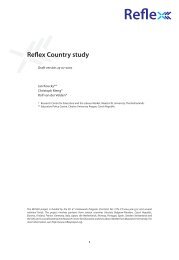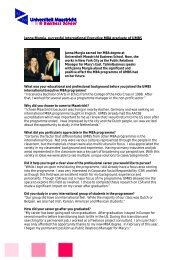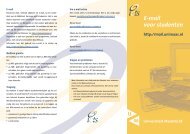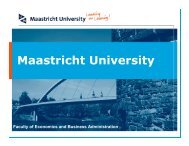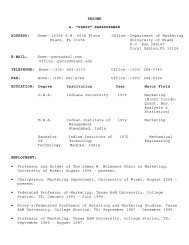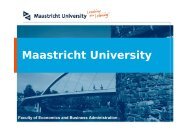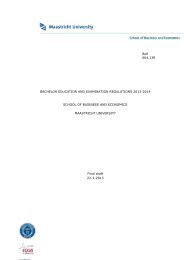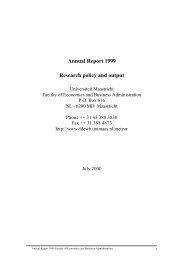proceedings of Student Mobility and ICT: Can E-LEARNING
proceedings of Student Mobility and ICT: Can E-LEARNING
proceedings of Student Mobility and ICT: Can E-LEARNING
Create successful ePaper yourself
Turn your PDF publications into a flip-book with our unique Google optimized e-Paper software.
established, nurtured, <strong>and</strong> brought to fruition without having physically to go anywhere or confront anyone<br />
F2F. In general, the level <strong>of</strong> participation in the forums was good, <strong>and</strong> certainly more evenly balanced than<br />
if class time had been required to explore the issues. It appears that this communication medium provided<br />
an acceptable environment for both sexes <strong>of</strong> high <strong>and</strong> low context communication to expose their opinions.<br />
Surprisingly, we saw little <strong>of</strong> the “yes/no” response with no justification for the opinion. Of course,<br />
students realized that they were being graded on their participation but with no direct feedback from the<br />
pr<strong>of</strong>essor, they seemed to communicate with each other because <strong>of</strong> interest in the topic <strong>and</strong> the existence <strong>of</strong><br />
the virtual platform.<br />
Our original basis for using the discussion forum to expose opinions, points <strong>of</strong> view, <strong>and</strong> debate<br />
was that the context-communication make up <strong>of</strong> the classroom precluded the possibility <strong>of</strong> meaningful<br />
dialogue. People from low context environments tend to voice opinions with ease. Those from high<br />
context environments are more reserved <strong>and</strong> deferential in their responses. They tend to refer to the<br />
pr<strong>of</strong>essor’s power position <strong>and</strong> therefore respond as they believe would be expected from them or would<br />
choose to remain silent. In the world outside <strong>of</strong> the classroom, the student will be obliged to work with<br />
many different cultural-communication contexts. The importance <strong>of</strong> having the experience in a safe<br />
environment such as academia was significant. To be able to voice an opinion without sanction was a<br />
relatively novel concept for many <strong>of</strong> these students. As time is an important factor in communication<br />
across cultural contexts, the discussion forum setting made it possible for those more hesitant to respond<br />
spontaneously to express their opinion <strong>and</strong> to enter into dialogue with their peers.<br />
Future Research<br />
As business ethics comes into its own as a serious field <strong>of</strong> international research, availability <strong>of</strong><br />
quality educational materials <strong>and</strong> learning platforms for global business training will increase in<br />
importance. With growing international student <strong>and</strong> workforce mobility, educators have a rare opportunity<br />
to shape the evolving global business l<strong>and</strong>scape both with research <strong>and</strong> with teaching. Sophistication <strong>of</strong><br />
content <strong>and</strong> content deployment methods will continue to increase as physical <strong>and</strong> virtual borders merge.<br />
The traditional homogeneous learning environment is fast receding into the archives <strong>of</strong> academia. Now that<br />
the asynchronous forum is a mainstream learning tool, the next study will address the effectiveness <strong>of</strong> the<br />
individual forum scenarios for exposing differences <strong>of</strong> ethical reflections based upon culture context<br />
communication. To design scenarios which elicit reflection, good dialogue, <strong>and</strong> life effective learning<br />
without being dogmatic or biased is challenging. It will require the skill sets <strong>of</strong> the content designer to<br />
include cross-cultural sensitivity, generational relevancy, <strong>and</strong> academic pr<strong>of</strong>iciency in order to create<br />
effective material which will motivate the multi-cultural learner who will occupy the physical <strong>and</strong> virtual<br />
classrooms <strong>of</strong> our networked world.<br />
Appendix<br />
Business Ethics Discussion Forum Cases<br />
Ethical Issue 1: Corruption in the airline industry<br />
TPOG Aviation Services manufactures small aircrafts in the 20-40 seat range for civil aviation. In<br />
the past, they counted long-established, prestigious companies such as Lufthansa, British Airways <strong>and</strong> Air<br />
France among their clients. Recently, TPOG developed a new model, the TPOG LA 533 aiming at<br />
optimizing life cycle <strong>and</strong> maintenance costs <strong>of</strong> the aircraft. However, their former clients are no longer<br />
interested in buying this type <strong>of</strong> aircraft. Therefore, TPOG needs to explore new markets. Now they’re<br />
negotiating a very important option for a contract for 15 aircrafts with Flying High Inc., a largely stateowned<br />
company in country X. Yet country X has a corrupt government; bribery <strong>and</strong> special compensation<br />
schemes are common practice. There are also three other competitors behind this contract. TPOG knows<br />
that one <strong>of</strong> them who has already been working in this country for a long time has been involved in this<br />
kind <strong>of</strong> practice. During the negotiations executives <strong>of</strong> Flying High Inc. hinted to TPOG that "special<br />
compensations could enhance the chances <strong>of</strong> getting the contract." On the one h<strong>and</strong> TPOG has the<br />
reputation to have very high ethical st<strong>and</strong>ards, on the other the company is in a very tight financial situation<br />
Conference <strong>proceedings</strong> <strong>of</strong> <strong>Student</strong> <strong>Mobility</strong> <strong>and</strong> <strong>ICT</strong>: <strong>Can</strong> E-<strong>LEARNING</strong> overcome barriers <strong>of</strong> Life-Long learning?” 194


